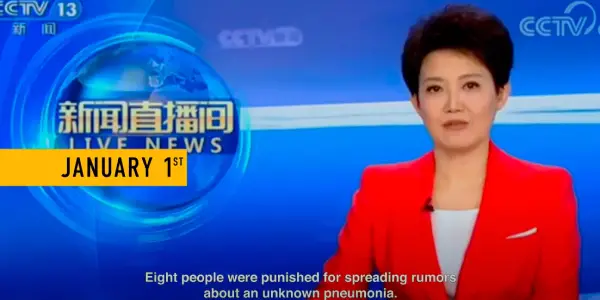It was only a matter of time before filmmakers would start creating content about the COVID-19 pandemic, and it makes perfect sense that documentaries would be at the forefront of these artistic endeavors. Taking a step back and examining how the pandemic started, it’s hard not to be curious about Wuhan, China; the city that is considered ground zero of this global health crisis. Nanfu Wang returns to Sundance with another harrowing documentary that is just as honest and compelling as her 2019 film, One Child Nation. In the Same Breath breaks down the events of what actually transpired in Wuhan during the start of the COVID-19 pandemic. Wang investigates the cover-ups and misaligned information relayed by government officials and provides a voice to those who find the bravery to speak up against their own authoritarian government. This probably won’t be the last documentary about COVID-19 and the city of Wuhan, but it’s certainly the only one you absolutely need to watch right now.
Humanizing a geopolitical film
Given the geopolitical tensions between China and the United States, any film centering on the city of Wuhan has the potential of being highly politicized. It’s the reason why Hao Wu’s 76 Days – the first documentary about COVID-19 to premiere at a major film festival back in 2020 – avoided all pretenses of politics. Wu chose to focus solely on the humanism of the city and its inhabitants, making a conscious decision not to step outside the boundaries of this narrative focus. The film certainly works well for this very reason, but Wang obviously set out to make a very different film. Not only does In the Same Breath cross that boundary of political commentary, but it also relishes in it and allows audiences to interrogate the situation in a thoughtful manner.

It’s no secret that most of the world has been harboring a collective sense of skepticism when it comes to China’s initial response to the COVID-19 pandemic. The lack of transparency and scents of cover-ups have been widely reported by the media, and Wang dives straight into the angst that most viewers are already familiar with. This film is highly critical of the Chinese government’s actions, provides convincing evidence in making its case, and never apologizes for being a film about politics.
But despite Wang’s strong convictions as a prosecutor of the truth, she also never loses sight of the humanity behind this learned truth. Similar to 76 Days, there is no shortage of captivating footage that places audiences in an intimate setting with patients and healthcare workers. There’s enough grueling imagery to remind viewers that human lives are at stake, regardless of the grander sociopolitical issues. Wang finds a way of humanizing what could have solely been a geopolitical film. There’s anger and frustration over the Chinese government, but there’s an even greater sense of empathy for the people affected by their actions.
A tale of two countries
I don’t think it’s hyperbolic to say that Nanfu Wang is probably the perfect filmmaker to tackle a documentary of this nature. Being born and raised in Mainland China, and now living in the United States, Wang offers a duality in her world views, which is an asset when it comes to an American film about a (primarily) Chinese news item. That doesn’t mean that Wang’s voice is without bias, but it does add a cultural nuance to her opinions that can’t be manufactured artificially.
This duality was ever so present in One Child Nation where, as a product of the One-Child policy herself, she was undoubtedly a perfect narrator for that specific story. The same degree of appropriation doesn’t necessarily apply for In the Same Breath, but Wang’s familiarity with both Chinese and American culture certainly makes her well equipped to critically examine both countries. Shifting some of her attention to the American government’s response to the pandemic, she holds up a mirror to show some of the glaring similarities between the two countries. Wang never goes as far as labeling the two governments as equals in terms of their actions but finds a way to at least encourage discourse on the corollaries.
Conclusion: The COVID-19/Wuhan documentary we need
There’s almost no question that more documentaries about the COVID-19 pandemic will find their way into the market over the next year or two. Being an evolving situation that we continue to live through at this very present moment, it’s hard to say whether there will be a more important film about the pandemic. But at this particular moment, In the Same Breath certainly feels like the COVID-19 documentary that the world needs to see. Wang tackles one of the biggest political questions surrounding the origin of this global health crisis and does so without ignoring the humanism behind the story. The film comes from a place of authenticity and candor, and like any good cross-examination of the truth, will make you want to ask even more questions.
Does content like this matter to you?
Become a Member and support film journalism. Unlock access to all of Film Inquiry`s great articles. Join a community of like-minded readers who are passionate about cinema - get access to our private members Network, give back to independent filmmakers, and more.